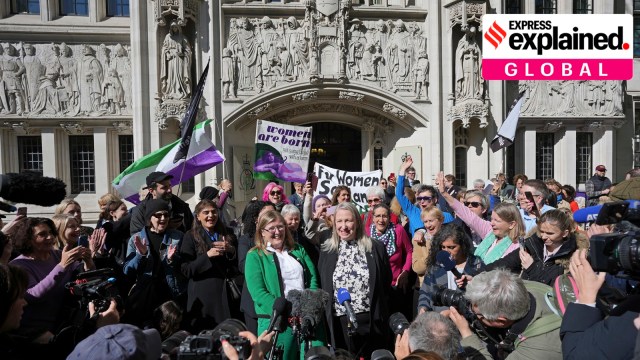The United Kingdom Supreme Court held in a judgment on Wednesday (April 16) that when using terms such as “woman”, the Equality Act of 2010 referred to biological sex and not gender. This effectively keeps transgender women out of the purview of the Act, aimed at protection against discrimination, harassment and victimisation.
Further, a transgender person having an official certificate that recognises them as female should not be considered a woman under this law. However, it does not mean that transgender people will not be protected from discrimination under other legal provisions, the court said.

Several groups which oppose the view that trans people should be viewed in terms of their self-declared gender identity welcomed the verdict. This included the For Women Scotland (FWS) group that fought the case for a more exclusive definition of “woman”. It also found a prominent financial backer in Scottish author JK Rowling. Here is what to know.
What was the case?
Story continues below this ad
It was related to the definition of “woman” in the Gender Representation on Public Boards (Scotland) Act of 2018. The law created gender representation targets to increase the proportion of women on public boards in Scotland.
Scottish Ministers then issued a new statutory guidance saying the definition of a “woman” under the 2018 Act was the same as that of the 2010 Equality Act. Section 212 of the EA defines “woman” as “a female of any age.” The guidance also stated that a person with a Gender Recognition Certificate recognising their gender as female was considered a woman under the 2018 Act.
In the UK, GRCs allow trans people to change their gender legally. A person can obtain a GRC if they provide evidence that they have or have had gender dysphoria (discomfort with one’s gender assigned at birth), have lived as their “acquired gender” for two years and intend to continue to do so until death.
In 2022, the FWS group challenged the definition of “woman” under the 2010 Act, saying it only referred to biological sex. The case eventually reached the UK Supreme Court, following dismissals from other courts.
What did the two sides argue?
Story continues below this ad
The FWS argued that the case would have consequences in Scotland, England and Wales for sex-based rights (mostly meant to safeguard women) and gendered spaces such as toilets, hospital wards and prisons.
“Not tying the definition of sex to its ordinary meaning means that public boards could conceivably comprise of 50% men, and 50% men with certificates, yet still lawfully meet the targets for female representation,” the group’s director Trina Budge said previously. Notably, FWS says on its website, “We believe that there are only two sexes, that a person’s sex is not a choice, nor can it be changed.”
While sex is a biological characteristic that is often categorised as male (XY sex chromosomes) and female (XX chromosomes), there is also a category of intersex people who do not fit into this binary. Beyond sex is the deeper question of gender identity – which is a social construct and how one chooses to present oneself to the world.
Increasingly, progressive groups argue that gender is a spectrum and that a strict masculine/feminine binary cannot apply to the entire human race. On the question of inclusion, they argue that owing to their marginalisation in society, transgender people should be given legal representation and protected against discrimination, as women often are.
Story continues below this ad
The judgment also comes at a time of increased advocacy of LGBTQ rights in recent years, accompanied by a pushback from conservative sections of society. In the US, too, the Donald Trump administration has challenged the participation of trans women in women’s sports.
Groups like FWS say sex and gender are both static and often do not differentiate between the two concepts. Therefore, they see the existence of trans women as men infiltrating women’s spaces. In response, Amnesty International said, “A blanket policy of barring trans women from single-sex services is not a proportionate means to achieve a legitimate aim.”
What did the SC rule?
The SC referred to how Parliament and previous judgments have interpreted the words “woman” and “man”.
According to The Guardian, the court said that while the word “biological” did not appear in the Equality Act, “the ordinary meaning of those plain and unambiguous words corresponds with the biological characteristics that make an individual a man or a woman”. Modifying the understanding would result in “practical difficulties” across other laws, too, it said.
Story continues below this ad
The long-term implications of the judgment are being assessed in the UK, however, a common view is that it would make it easier for groups like the FWS to argue for the exclusion of trans people from single-gender spaces.
Crucially, an official summary said, “This interpretation of the EA 2010 does not remove protection from trans people, with or without a GRC. Trans people are protected from discrimination on the ground of gender reassignment. They are also able to invoke the provisions on direct discrimination and harassment, and indirect discrimination on the basis of sex. In the light of case law interpreting the relevant provisions, a trans woman can claim sex discrimination because she is perceived to be a woman.”








































